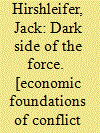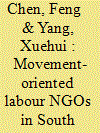|
|
|
Sort Order |
|
|
|
Items / Page
|
|
|
|
|
|
|
| Srl | Item |
| 1 |
ID:
045942


|
|
|
|
|
| Publication |
Cambridge, Cambridge University Press, 2001.
|
| Description |
viii, 357p.
|
| Standard Number |
0521009170
|
|
|
|
|
|
|
|
|
|
|
|
Copies: C:1/I:0,R:0,Q:0
Circulation
| Accession# | Call# | Current Location | Status | Policy | Location |
| 046947 | 330/HIR 046947 | Main | On Shelf | General | |
|
|
|
|
| 2 |
ID:
153636


|
|
|
|
|
| Summary/Abstract |
Movement-oriented labour NGOs in China are groups committed to the advancement of workers’ collective interests in a way very similar to that of trade unions in other countries. As the gap between workers’ demands for collective bargaining and their lack of union representation widens, the role of movement-oriented labour NGOs has increased. These NGOs are led and driven by former workers who have a strong consciousness of workers’ rights and who fought in the workplace for their fellow workers’ interests as well as their own. The leadership shown by former workers significantly accounts for the behavioural patterns and strategic choices of movement-oriented labour NGOs. The study reported in this article uses two descriptive concepts to characterize the emergence and role of movement-oriented labour NGOs: exit with voice and displaced unionism. The former refers to the social process by which former workers become activists of movement-oriented labour NGOs, while the latter points to a grass-roots labour movement facilitated from outside the factory gates. This article argues that, while having performed a trade union-like role and promoted worker-led collective bargaining, movement-oriented labour NGOs embody a fundamental predicament of the Chinese labour movement, which is that organized labour activism in the Chinese workplace is largely prohibited.
|
|
|
|
|
|
|
|
|
|
|
|
|
|
|
|
| 3 |
ID:
168018


|
|
|
|
|
| Summary/Abstract |
This article analyses the way in which, since 2010, Chinese trade unions have been trying to find forms of authoritarian collective bargaining that allow them to advance workers’ interests without calling into question their belonging to the state apparatus. It compares the case of the Dalian Industrial Zone to that of the Shenzhen Pilot Zone in a bid to understand how the unions try to acquire effectiveness and legitimacy in the absence of any progress in terms of representation.
|
|
|
|
|
|
|
|
|
|
|
|
|
|
|
|
| 4 |
ID:
124306


|
|
|
|
|
| Publication |
2013.
|
| Summary/Abstract |
Any meaningful attempt to understand how the Soviet system evolved and 'worked' must take into account not only those who conformed ideologically, but also those who actively embraced alternative frameworks of meaning. This paper centres on the experience of a young factory worker, Petr Terekhovich, who, in the mid-1920s, abandoned 'godlessness' to devote himself to the charismatic lay preacher, Brother Ioann Churikov, and to a highly ascetic, scripture-based form of sobriety. Drawing largely on archival materials, it seeks to understand Terekhovich's story as a case study of religious struggle, belief and activism, an account of persecution by atheist officials, and ultimately, a narrative of resistance, spiritual freedom and self-determination under Soviet rule.
|
|
|
|
|
|
|
|
|
|
|
|
|
|
|
|
|
|
|
|
|